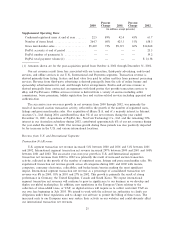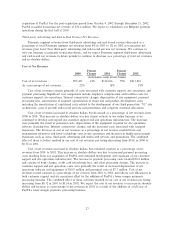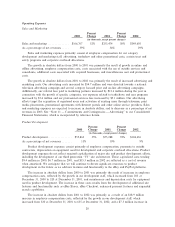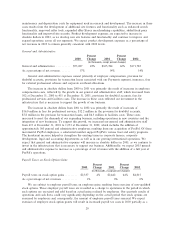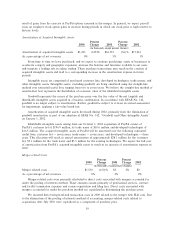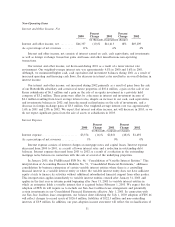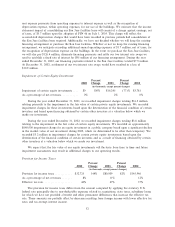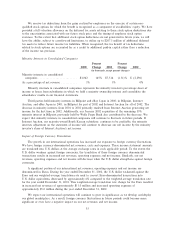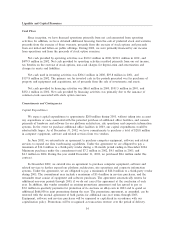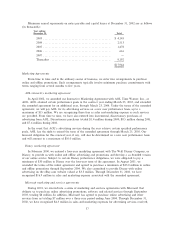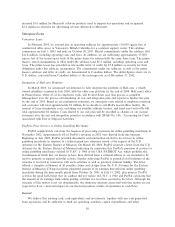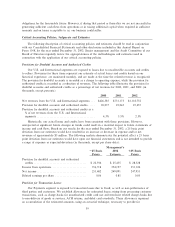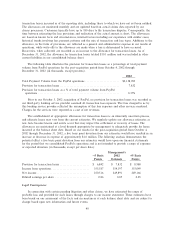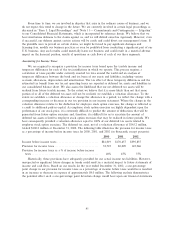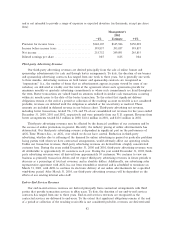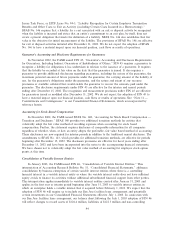eBay 2002 Annual Report Download - page 37
Download and view the complete annual report
Please find page 37 of the 2002 eBay annual report below. You can navigate through the pages in the report by either clicking on the pages listed below, or by using the keyword search tool below to find specific information within the annual report.Leases
On March 1, 2000, we entered into a Ñve-year lease for general oÇce facilities located in San Jose,
California. This Ñve-year lease is commonly referred to as a synthetic lease because it represents a form of
oÅ-balance sheet Ñnancing under which an unrelated third-party funds 100% of the costs of the acquisition
of the property and leases the asset to us as lessee. Under our lease structure, upon termination or
expiration, at our option, we must either purchase the property from the lessor for a predetermined amount
or sell the real property to a third party. Our San Jose lease consists of approximately 460,000 square feet
of oÇce space. As of December 31, 2002, we occupied approximately 314,000 square feet of this total
oÇce space and subleased additional space in the facility to third parties.
Payments under our lease are based on the $126.4 million cost of the property funded by the third
party and are adjusted as the London Interbank OÅered Rate, or LIBOR, Öuctuates. Under the terms of
the lease agreement, the lease terminates on March 1, 2005, unless extended to September 1, 2006. At any
time prior to the Ñnal 12 months of the lease term, we may, at our option, purchase the property for
approximately $126.4 million. If we elect not to purchase the property, we will undertake to sell the
facility to one or more third parties and have guaranteed to the lessor a residual value equal to
approximately 88% of the $126.4 million cost of the property. Our maximum exposure to loss is the entire
amount of $126.4 million if we default on any of certain lease obligations and Ñnancial covenants. If this
payment were made, we would then receive title to the property. At December 31, 2002, we had not made
a decision with respect to the option we will pursue at the end of the lease term. Management believes
that the contingent liability relating to the residual value guarantee will not have a material adverse eÅect
on our Ñnancial condition, results of operations or cash Öows.
In addition, we are required to maintain $126.4 million of cash and investment securities as collateral
for the term of the lease and to maintain certain Ñnancial covenants. The cash and investment securities
are restricted as to their withdrawal from a third-party trustee and are classiÑed as long-term restricted
cash and investments on our balance sheet. In the event of a default under the lease, the collateral could
be used to pay the purchase price of the property and the lease would be terminated. At December 31,
2002, we were in compliance with our Ñnancial covenants under the lease.
If our lease were terminated, and we became obligated to pay the purchase price of the land and
buildings, we would show the cost as an asset on our balance sheet and our restricted cash and
investments position would be reduced by the amount of the purchase price. Currently, we reÖect rent
payments as an operating expense on our statement of income. In the event we were required to purchase
the land and buildings, our rent expense would cease and we would subsequently record depreciation
expense for the buildings over their estimated useful lives.
We entered into two interest rate swaps on June 19, 2000 and July 20, 2000, to reduce the impact of
changes in interest rates on a portion of the Öoating rate operating lease for our facilities. See ""Item 7A:
Quantitative and Qualitative Disclosures About Market Risk'' and ""Note 6 Ì Derivative Instruments'' to
our Consolidated Financial Statements, which is incorporated by reference herein.
In January 2003, the FASB issued FIN 46, ""Consolidation of Variable Interest Entities.'' This
interpretation of Accounting Research Bulletin No. 51, ""Consolidated Financial Statements,'' addresses
consolidation by business enterprises of certain variable interest entities where there is a controlling
Ñnancial interest in a variable interest entity or where the variable interest entity does not have suÇcient
equity at risk to Ñnance its activities without additional subordinated Ñnancial support from other parties.
This interpretation applies immediately to variable interest entities created after January 31, 2003 and
applies in the Ñrst year or interim period beginning after June 15, 2003 to variable interest entities in
which an enterprise holds a variable interest that it acquired before February 1, 2003. We expect that the
adoption of FIN 46 will require us to include our San Jose facilities lease and potentially certain
investments in our Consolidated Financial Statements eÅective July 1, 2003. In connection with our San
Jose facilities lease arrangement, our balance sheet following the July 1, 2003 adoption of FIN 46 will
reÖect changes to record assets of $126.4 million, liabilities of $122.5 million and non-controlling interests
of $3.9 million. In addition, our post-adoption income statement will reÖect the reclassiÑcation of rent
35


